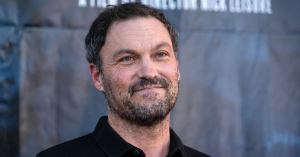When Netflix released Season 3 of Ozark on March 27, the crime drama continued to explore the increasingly-complicated world the Byrde family has built for themselves along the shores of Osage Beach, Missouri. It also introduced its dedicated viewers to the character of Ben Davis, played by actor Tom Pelphrey.
Along with Ozark’s usual dose murder, betrayal and money-laundering, Ben, the bipolar brother of Laura Linney‘s Wendy Byrde, wanders into the thick of everything early on in Season 3. By the time the season concludes, he manages to leave a massive impact on the show’s core characters, as well as creating what’s likely to be a lasting change to the series’ emotional landscape. Along the way, Pelphrey was able to breathe life into the perpetually down-luck character, making him a sympathetic, albeit still tragic figure in the acclaimed crime drama.
Videos by PopCulture.com
In an interview with PopCulture, Pelphrey explains what went into playing Ben, including how the writing guided his portrayal, his mesmerizing monologue in Episode 9 (“Fire Pink”), to how he was able to create a charmingly authentic on-screen rapport with Linney. Be warned: there are some minor spoilers for Season 3 of Ozark to follow.
Taking on the Character
After landing the role of Ben, Pelphrey wasn’t exactly clear on how many ripples in the pond his character would end up creating. It wasn’t until showrunner Chris Mundy reached out to map out “the end-arcs for the season.” While Mundy had “kind of painted in broad strokes” what was in store for his character, Pelphrey says that it gave him “a clear idea of what would be happening and when, which was really, really helpful.”
However, Pelphrey’s full understanding of Ben came clear after he read the scripts for the individual episodes. “I don’t think I understood the magnitude of the impact it would have on the overall story until I read the scripts,” he explains. “Particularly [Episodes] 8 and 9 is when I was like, ‘Oh, oh, this will really change things.’”
Knowing Ben Was Right
Despite Ben’s bipolar condition, it wasn’t lost on Pelphrey that he was the only character who seemed willing to call out his sister’s money-laundering front, much to the ire of her, but also her husband, Marty (Jason Bateman). Given the circumstances, he was also quite prone to openly expressing his disapproval of it, much to his character’s detriment — as well as quite a few others.
“I think that really landed on me as I was reading the scripts, like all of the bipolar aside, it became very clear that in this world of lies and manipulation, Ben was just telling the truth,” he says. “He was just calling out the truth. So, sure, I think that was a huge part of why he did what he did and why he was reacting to things the way he was. Because it was his sense of right and wrong.”
Pelphrey also pointed to a line of dialogue he delivers to Ruth (Julia Garner), who’s both Ben’s lover and a key employee of the Byrdes’ massive illegal operation. While his character was briefly committed to a state mental hospital, “Ruth comes to visit him and Ben says, ‘What exactly am I wrong about?’”
Helping to Create Complexity

While Pelphrey was always aware of Ben’s condition, the irony of him being the one character who seemed to be thinking rationally wasn’t something he mined for his performance. However, he says that much of the nuance in how he chose to convey these things was “an effect of the writing, the overall storytelling.”
“I think that is a credit to the writers wanting to present a complexity where, on the one hand, I think there’s a lot of ways in which the audience could watch what Ben is doing and understand it and support him and also feel outraged about what he’s outraged by and also feel like somebody should say the truth to what he says,” he explains.
“On the other hand, because we know the show and we know the Byrdes and we know what’s at stake, there’s a part of the audience that — I’m sure — is looking at what Ben is doing and saying, ‘Don’t do that! That’s so bad! You’re going to cause so many problems, you’re going to get people killed!’ So, I just think that that was excellent writing in the sense that sort of great, you know, quote-unquote ‘tragedy’ is like, yes, we fully understand why this is happening and makes perfect sense — and yet it’s going to end terribly.”
Of course, much of what Pelphrey describes is applicable to the appeal that Ozark has with viewers after three seasons. “I think we all love when those kinds of stories can be told and told well, and that’s a credit to their writers.”
Ben’s Monologue
Some of that writing was evident in the opening minutes of “Fire Pink,” the ninth episode, which begins with a chilling monologue delivered by Ben in the back of a cab. In the episode prior, the had just been released from the mental hospital, where he was put by Wendy, and followed that up with a heated confrontation with Helen (Janet McTeer), the cartel’s lawyer. Amid all of Ben’s endless tangents, ticks and emotional confessions, Pelphrey said the monologue “looked on the page almost exactly word for word, what you see in the show.”
“It was, and is — in my opinion — just that genius piece of writing,” he reveals. “I knew it as soon as I read it, I was simultaneously slightly intimidated and very excited, and I had the benefit of being able to get to work on that scene for weeks before I had to film it. It was one of the last things that we filmed, so I had plenty of time to feel very comfortable with the words and the structure and to get everything down perfect.”
Letting the Writing Speak for Itself
Like a lot of scenes, Pelphrey opted to let himself become a conduit for the script, rather than offer up his own suggestions or tailor the scene to his requests. It was a decision he made out of respect for a scene that he felt wouldn’t benefit from any of his suggestions.
“Like when you have writing that’s that good, there’s nothing you can do to add to it through improvisation or anything. In my opinion, you can only make it worse,” he explains. “So, there’s a real desire to live up to the quality of the writing and being prepared and having everything word-perfect allows you a freedom to… relax and sort of surprise yourself. Like sort of just get out of the way and let the writing room take you where it’s gonna take you — and you can be present with the writing and sort of be surprised by where it goes because you know the writing is good. You know you can’t go wrong.
Pelphrey also described the scene as “a rare gift to have writing that is that excellent in my experience.”
Working With Laura Linney

Along with Ben’s slow downward spiral, his character is afforded plenty of scenes with Linney, where the two actors get to convey the full-range of a brother-sister dynamic. From giggle-filled glee to steely-eyed stares, the relationship between Ben and Wendy stands out as one of Season 3’s highlights. As Pelphrey describes it, the rapport between the two was “pretty close to automatic.”
“Laura is an actor whose work I’ve admired for many, many years. Somebody who I’ve enjoyed watching and learning from… god, for so long now,” he says. “I was looking forward to meeting her and as soon as I met her, she just pulled me into a hug and started talking and she made me feel so welcome and so at ease and so comfortable. And, I mean, her talent is obvious. We all know how talented of an actor she is, but she has that generosity of spirit as a person. She’s a giver. She’s amazingly generous with her energy and with her focus. And it made working at Ozark a very safe space for me. It made me extremely comfortable with her. She’s just a very good human being.”
“So, I credit so much of our on-screen chemistry to the fact that Laura’s just so wonderful,” he adds. “I was excited to be there and excited to get to work with her. I knew she would make me a better actor, which she did, and she was just an excellent host. You know, I’m coming into her show and she was so generous with me, and I’ll always be grateful for that. And it’s a good lesson to learn because it teaches you how you want to be in the future with other people that you work with.”
What’s to Come
Like many people across both the U.S. and the world, Pelphrey has also been self-isolating to help slow the spread of coronavirus. When asked about what kind of project he’d want to do when he’s able to get back to work, the actor didn’t sound too terribly picky.
“I guess on some level, just being able to get out of our homes and get my ass back to normal will be exciting in and of itself,” he says. All three seasons of Ozark are currently available to stream on Netflix.
Most Viewed
-

Beverly Hills, CA – January 31, 2026: Jelly Roll, left, and Bunnie Xo, right, pose for portraits on the red carpet during the 68th GRAMMY Awards Pre-GRAMMY Gala & GRAMMY Salute to Industry Icons Honoring Avery Lipman & Monte Lipman at the Beverly Hilton on Saturday, Jan. 31, 2026 in Beverly Hills, CA. Clive Davis’ annual pre-Grammy party hosts an array of A-listers from entertainment, sports, and politics to come together and enjoy performances. (Kayla Bartkowski/ Los Angeles Times)







